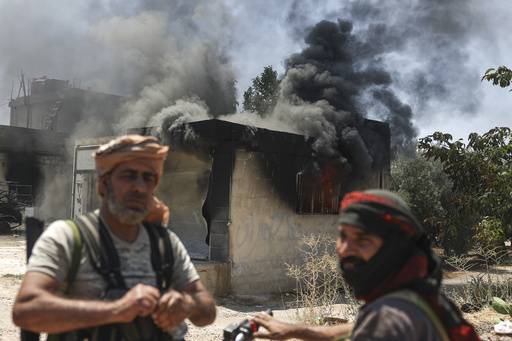Post-Assad Syria a powder keg waiting to blow, observers fear

BEIRUT—An eruption of violence in Syria this week that entangled government forces, Bedouin tribes, the Druze religious minority and neighboring Israel highlighted just how combustible the country remains seven months after its longtime authoritarian leader was toppled.
The Druze and other minorities increasingly mistrust a central government run by a man once affiliated with al-Qaida, even though he has pledged to protect Syria’s diverse ethnic and religious groups since helping to oust Bashar Assad after a nearly 14-year civil war.
This sectarian turbulence within Syria threatens to shake-up postwar alliances and exacerbate regional tensions, experts say. It could also potentially draw the country closer to Turkey and away from Israel, with whom it has been quietly engaging since Assad’s fall, with encouragement from the Trump administration.
Deadly clashes broke out last Sunday in the southern province of Sweida between Druze militias and local Sunni Muslim Bedouin tribes.
Government forces intervened, ostensibly to restore order, but ended up trying to wrest control of Sweida from the Druze factions that control it.
‘Executed’
About 600 were killed in the fighting, according to the Syrian Observatory for Human Rights, and some government fighters allegedly executed Druze civilians and burned and looted their houses.
Driven by concerns about security and domestic politics, Israel intervened on behalf of the Druze, who are seen as a loyal minority within Israel and often serve in its military.
Israeli warplanes bombarded the Syrian Defense Ministry’s headquarters in central Damascus and struck near the presidential palace. It was an apparent warning to the country’s interim President Ahmad al-Sharaa. The Israeli army also struck government forces in Sweida.
By Wednesday, a truce had been mediated that allowed Druze factions and clerics to maintain security in Sweida as government forces pulled out—although fighting persisted between Druze and Bedouin forces. Early Saturday, US envoy to Syria Tom Barrack announced a separate ceasefire had been brokered between Israel and Syria.
Violence is only part of the problem. Syria’s minority groups only have been given what many see as token representation in the interim government, according to Bassam Alahmad, executive director of Syrians for Truth and Justice, a civil society organization.
Transition
“It’s a transitional period. We should have a dialogue, and they (the minorities) should feel that they’re a real part of the state,” Alahmad said. Instead, with the incursion into Sweida, the new authorities have sent a message that they would use military force to “control every part of Syria,” he said.
“Bashar Assad tried this way,” and it failed, he added.
On the other hand, supporters of the new government fear that its decision to back down in Sweida could signal to other minorities that it’s OK to demand their own autonomous regions, which would fragment and weaken the country.
If Damascus cedes security control of Sweida to the Druze, “of course everyone else is going to demand the same thing,” said Abdel Hakim al-Masri, a former official in the Turkish-backed regional government in Syria’s northwest before Assad’s fall.
“This is what we are afraid of,” he said.
Before this week’s flare-up between Israel and Syria, and despite a long history of suspicion between the two countries, the Trump administration had been pushing their post-Assad leaders to work toward normalizing relations—meaning that Syria would formally recognize Israel and establish diplomatic relations, or at least enter into some limited agreement on security matters.
Syrian officials have acknowledged holding indirect talks with Israel, but defusing decades of tension was never going to be easy.

















